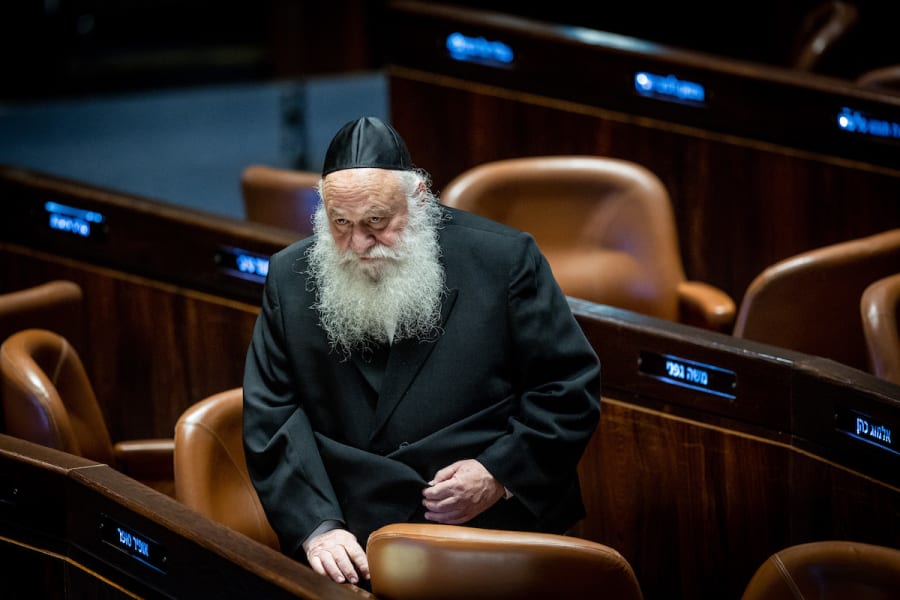Ultra-Orthodox party head pushes religious-secular button, opposes train maintenance work on Shabbat

Israeli Housing Minister and United Torah Judaism party head Yitzhak Goldknopf wrote a letter to request that Transportation Minister Miri Regev put an end to maintenance work on trains by Israel Railways during the Jewish Sabbath.
“It has been brought to my attention that there is work on Shabbat at Israel Railways that does not meet the definition of preserving life,” Goldknopf stated, naming the religious standard that permits breaking the Shabbat prohibition against performing work.
Orthodox Judaism stipulates that no work should be performed during Shabbat, with the exception of work that preserves life, such as healthcare and security.
Goldknopf’s request could be the Netanyahu government’s first real test in maintaining coalition partners that are guided by different sectarian political interests. While Netanyahu’s Likud party is largely secular, its political partners are national-religious and ultra-Orthodox.
Like most public transportation in the Jewish state, Israel Railways does not operate during Shabbat. However, Shabbat has been used to perform upgrades and maintenance along Israel’s expanding railway network in order to facilitate travel for passengers during the week.
In his letter, Goldknopf requested that the transportation minister urgently address the issue: “We cannot put up with this situation. I ask for your urgent intervention in this matter.”
Former Israeli Transportation Minister MK Merav Michaeli blasted Goldknopf’s request and urged her successor, Regev, to continue the policy of train maintenance work on Shabbat.
“The cost of stopping work on the railway system on Shabbat – tremendous harm to the public who use the trains and public transport,” tweeted Michaeli, who is the head of the secular Labor party. “I call on Regev not to concede to Goldknopf’s delusional demands.”
Former Finance Minister MK Avigdor Liberman echoed Michaeli’s criticism of Goldknopf’s letter.
“Once again, haredi wheeler-dealers are dictating to the entire public what is right and what is not,” Liberman wrote on social media, in harsh criticism of the housing minister.
“Stopping train track construction work on Shabbat is an absurd step that will directly affect Israel’s economy and many Israeli families who use public transport. Someone in the government needs to wake up and stop this madness,” Liberman said.
Liberman, who heads the secular Yisrael Beytenu party that caters to Russian-speaking Israelis, has a history of political clashes with Israel’s ultra-Orthodox parties concerning the role of religion in Israeli society.
Despite Israel marking only 75 years of independence this year, there is still significant disagreement among Israeli Jews about whether Israel should be defined as a secular-democratic state of the Jewish people, or a state ruled by religious Jewish law.
Israel’s commercial and cultural hub Tel Aviv has become a battleground for religious and secular Israeli politicians.
In early October, merely a month before the recent Israeli elections, Michaeli vowed that Tel Aviv’s upcoming light-rail system would operate seven days a week, including Shabbat.
“It is my decision and I reached it taking into consideration all the important implications [surrounding such a decision] brought before me,” Michaeli told Israel’s Channel 12.
Conservative religious politicians who oppose public transport during Shabbat criticized Michaeli’s statement. However, the overwhelming majority of the population in Tel Aviv are secular and theoretically would support the move.
Tel Aviv’s planned Metro system has become another battleground between Regev and Finance Minister Bezalel Smotrich.
Smotrich wants a quick second and third reading of the Metro bill by the Israeli parliament, in order to speed up the construction of the metropolitan infrastructure. However, Regev said she believes the Tel Aviv metro plan comes at the expense of infrastructure projects in Israel’s peripheral areas.
“I think that we must be required to look more in depth into two aspects – feasibility and financing, in addition to the question of whether it should be publicly or privately funded,” Regev said.
“There are problems in promoting the lines for the light rail in Gush Dan, which is supposed to provide an answer to the traffic congestion in Tel Aviv. As long as there is no solution to connect the State of Israel from Dan to Eilat [from the most northern point to the most southern point of Israel], I will oppose the further promotion of the plan,” she said.

The All Israel News Staff is a team of journalists in Israel.













